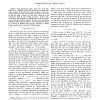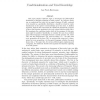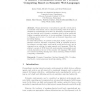45 search results - page 4 / 9 » Modal Semantics for Knowledge Bases Dealing with Vague Conce... |
101
click to vote
FUZZIEEE
2007
IEEE
15 years 6 months ago
2007
IEEE
— Fuzzy Description Logics (fuzzy DLs) have been proposed as a language to describe structured knowledge with vague concepts. It is well known that the choice of the fuzzy operat...
100
Voted
JANCL
2008
14 years 11 months ago
2008
This paper employs epistemic logic to investigate the philosophical foundations of Bayesian updating in belief revision. By Bayesian updating, we understand the tenet that an agen...
95
Voted
NLDB
2004
Springer
15 years 5 months ago
2004
Springer
Human interaction occurs always in a specific context and in a particular environment, and a common knowledge base about them is essential for understanding each other. By immersi...
110
Voted
KR
2000
Springer
15 years 3 months ago
2000
Springer
When reasoning in description, modal or temporal logics it is often useful to consider axioms representing universal truths in the domain of discourse. Reasoning with respect to a...
EUROMICRO
2004
IEEE
15 years 3 months ago
2004
IEEE
A contemporary office or knowledge worker has to deal with an ever increasing number of information channels and associated flows of events (i.e., software applications using vary...



